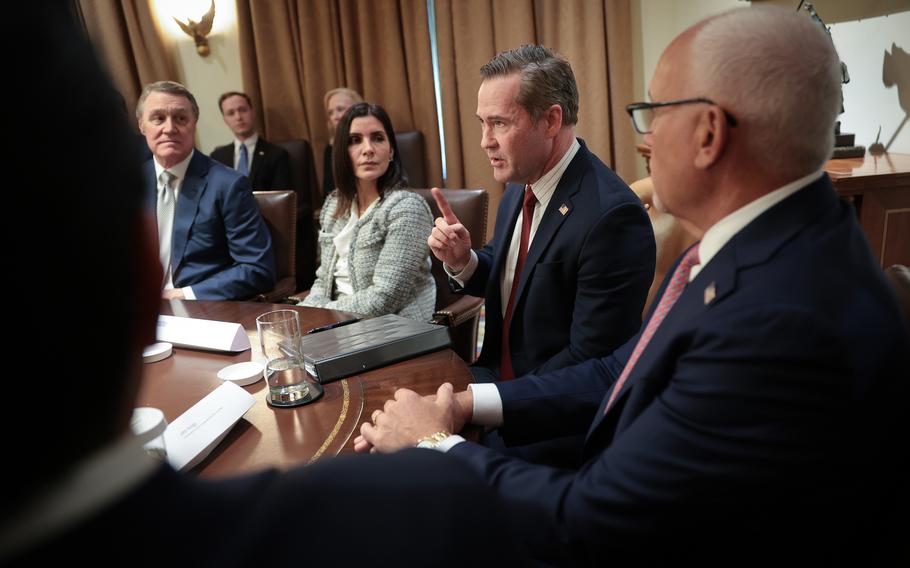
National Security Advisor Mike Waltz speaks during an ambassador meeting in the Cabinet Room of the White House on March 25, 2025, in Washington, D.C. During the meeting, Trump answered questions from reporters on the news that Jeffrey Goldberg, the editor-in-chief of The Atlantic magazine, was accidentally added to a Signal group chat of top administration officials, where highly sensitive national security information was discussed. (Win McNamee/Getty Images/TNS)
When Donald Trump first sought the presidency, one of his main issues against Democratic rival Hillary Clinton was her use of a private email server for communications, including some with secret or classified information.
Though the Justice Department absolved Clinton of any wrongdoing, FBI Director James Comey’s unfortunate reopening of the case in the week before the election may have played a significant role in Trump’s narrow victory.
The irony of the situation is that, both in office and in between, Trump has displayed a far more dangerous disregard of the requirements for security than Clinton — exemplified by his stashing secret documents at his Florida home and his casual response to the administration’s inclusion of a journalist in a secret discussion of a pending U.S. attack.
Indeed, only the delays by a friendly judge and Trump’s election last November prevented him from facing a federal trial on charges that included misuse of classified documents and obstruction of the investigation into his improper possession of them.
The controversy over including The Atlantic’s Jeffrey Goldberg on a Signal app message chain detailing the timeline for a forthcoming U.S. attack is just the latest of these incidents, rekindling concern among national security experts about the potential for serious security failures.
“This is a serious security breach,” former Defense Secretary Leon Panetta told the “PBS NewsHour.” “War plans, attack plans are among the most sensitive and classified information that you can have.”
Administration officials insist the information wasn’t classified. “There’s no units, no locations, no routes, no flight paths, no sources, no methods, no classified information,” the current defense secretary, Pete Hegseth, told the “NewsHour.”
Questions of inattention to security requirements have dogged Trump since early in his first administration when he took a cellphone call about a North Korean missile launch during dinner at Mar-a-Lago with Japan’s prime minister and discussed it within hearing of dozens of dinner guests.
Soon after, Trump himself caused a more serious security lapse, when he apparently revealed classified information and jeopardized a critical intelligence source during an Oval Office meeting with the Russian ambassador and foreign minister.
According to The Washington Post, Trump “revealed more information to the Russians than we have shared with our own allies.” It said he “went off script” in the meeting with Foreign Minister Sergey Lavrov and Ambassador Sergey Kislyak and “began describing details of an Islamic State terrorist threat related to the use of laptop computers on aircraft.”
Later during his presidency, CNN and The New York Times reported that Trump routinely violated the Presidential Records Act that requires keeping all documents by shredding papers, flushing some down the toilet and showing classified documents to people unauthorized to see them.
“I watched him show documents to people at Mar-a-Lago on the dining room patio,” former White House press secretary Stephanie Grisham told MSNBC. “So, he has no respect for classified information, never did.”
Her comments came after Trump was indicted on 37 counts of alleged mishandling of classified documents and obstructing government efforts to recover them, charges to which he pleaded not guilty.
The indictment included a partial transcript of a July 2021 meeting at his Bedminster golf club in New Jersey, in which Trump appeared to show off a classified Pentagon document that he had taken with him from the White House.
Last week’s disclosure of Goldberg’s inclusion in a discussion of pending attack plans brought expressions of concern from outside security experts, denials by the administration and a telling effort by Trump to sidestep the whole controversy.
“I don’t know anything about it” was Trump’s initial comment, a day after the news of the breach first surfaced. He then attacked the Atlantic as “a magazine that’s going out of business.”
“The main thing is that nothing happened,” he told NBC News a day later. He called criticism of the administration “a witch hunt” but noted, “I wasn’t involved with it.”
National security adviser Mike Waltz told Fox News’ Laura Ingraham that he took “full responsibility” for Goldberg’s inclusion in the discussion. And there have been subsequent reports his job may be on the line.
Top administration intelligence officials insisted to Congress that nothing disclosed was classified, even though the transcript included a detailed timeline for the pending attack.
After the Atlantic published the entire conversation, under a headline “Here are the Attack Plans that Trump’s Advisers Shared on Signal,” White House press secretary Karoline Leavitt seized on the wording to declare, “The Atlantic has conceded: these were NOT ‘war plans.’ ”
And Attorney General Pam Bondi, echoing Trump’s past campaign rhetoric, told reporters, “If you want to talk about classified information, talk about what was in Hillary Clinton’s home,” she said. “Talk about the classified documents in Joe Biden’s garage, that Hunter Biden had access to.” Both were cleared of improper use of classified documents.
Fortunately, senators from both parties may be taking the breach more seriously. Both the Republican chairman and senior Democrat on the Senate Armed Services Committee asked the Pentagon’s inspector general to look into whether classified information was shared in the discussion.
Meanwhile, Trump sought to end the discussion. “Michael Waltz has learned a lesson, and he’s a good man,” he told NBC, adding that the leak was “the only glitch in two months, and it turned out not to be a serious one.”
Based on his history, it won’t be the last.
Carl P. Leubsdorf is a former Washington bureau chief of The Dallas Morning News.